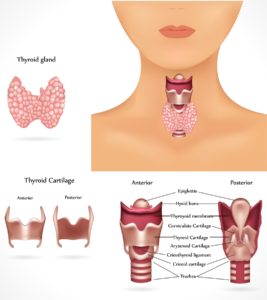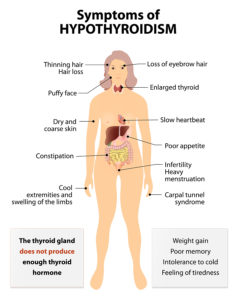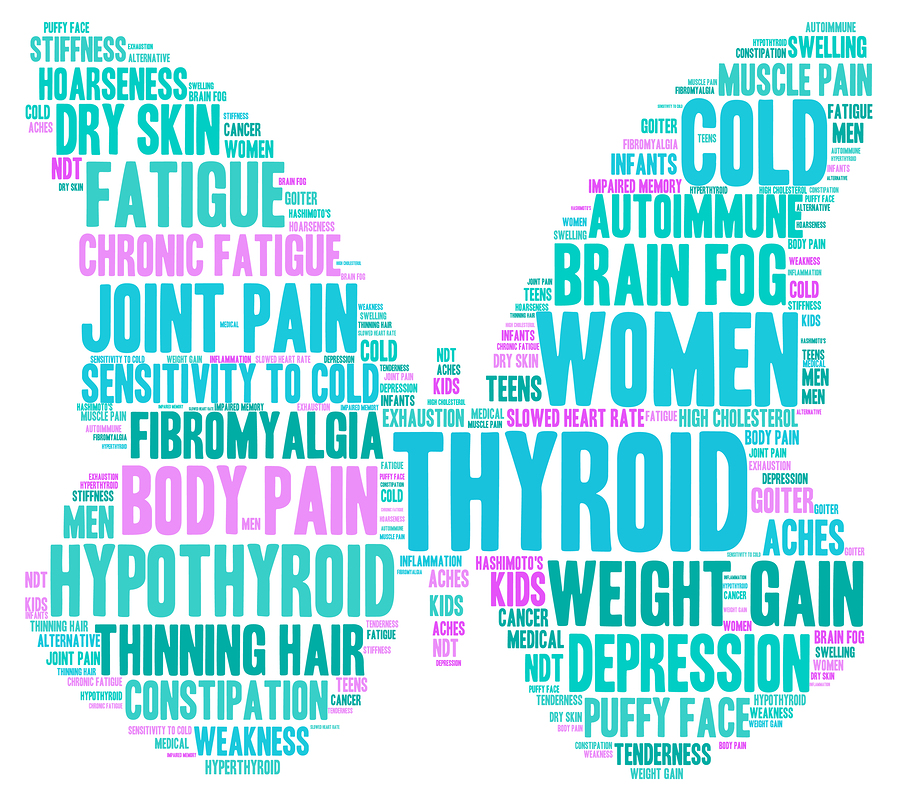My family has a history of thyroid problems, combined with my ex-wife’s introduction and treatment of hyperthyroidism, I’ve been around for quite a bit of experiences when it comes to you and your thyroid. Your thyroid is responsible for the proper function of just about every part of your body, including the metabolic rates of your heart, brain, muscles and more.
Symptoms of Thyroid Dysfunction
 Understanding how your body is working is key to knowing if you are suffering from either low or high T3 (liothyronine) and T4 (levothyroxine) levels. Most people have a natural regulator in their body, the actual thyroid gland that monitors and sustains a proper hormone level, but if your thyroid is not working properly, then the result can be a low or high hormone count causing various symptoms.
Understanding how your body is working is key to knowing if you are suffering from either low or high T3 (liothyronine) and T4 (levothyroxine) levels. Most people have a natural regulator in their body, the actual thyroid gland that monitors and sustains a proper hormone level, but if your thyroid is not working properly, then the result can be a low or high hormone count causing various symptoms.
Low Thyroid Symptoms
- Fatigue
- Constipation
- Hair Loss
- Dry Skin
- Weight Gain
- Cold Sensitivity
High Thyroid Symptoms
- Mood Swings
- Tremors
- Rapid Heartbeat
- Anxiety
- Trouble Sleeping
Types of Thyroid Disease

Hypothyroidism – is the reduced production of the T3 (liothyronine) and T4 (levothyroxine) hormone causing your body’s chemistry to slow down. The easier of the two to treat due to not having to treat the actual overproduction of hormones in your body and using supplements to boost your hormone levels to the proper count. Most of the time this form can be corrected by taking thyroid supplements to balance out the lack of natural production. Although finding the right balance of hormone levels and how your body will take to the drug can take anywhere from a few days to several weeks.
Hyperthyroidism – is the increased production of the T3 (liothyronine) and T4 (levothyroxine) hormone causing your body to ultimately speed up. This form of thyroidism is more complicated to treat often times needing surgery or other procedures to “kill off” your over producing thyroid.
Many patients who start off with “hyper” thyroidism will find that after initial treatment they fall into the “hypo” thyroidism category requiring supplemental hormone therapy. Once your body is no longer over producing your hormones, then you will need to follow a hormone regiment just like the counterpart to ensure your body is functioning properly.
Living with Thyroid Disease
Due to the fact that most people will end up as a “Hypo” patient regardless of how their thyroid problems started, I thought that covering how to live with the “hypo” version would be most adequate. After living with someone who has the disease, having a mother who also has it, and an Aunt that had to have surgery to due to thyroid cancer, there are more people than you think living with this disease on a daily basis.
Tips for Living with Your Thyroid
- Energy Foods – with a constant struggle of energy, making sure that you are eating the right amount of food throughout the day will absolutely aid you in keeping up with your routine demand.
 Include high protein and energy foods to help boost and maintain your energy levels throughout the day.
Include high protein and energy foods to help boost and maintain your energy levels throughout the day. - Exercise – weight gain is everyone’s nemesis, but if you suffer from thyroid disease, then you are at even more risk. So don’t let your thyroids dictate your body’s shape, instead fight back and get plenty of exercise to counter the natural weight gain that can occur with this disease.
- Stick to a Schedule – getting proper sleep is another key element to living a healthy life with thyroid disease, and while most people may feel tired throughout the day, going to bed on a fixed routine will help your body in the long run understand the awake and sleep cycles of your day.
 If you suffer from any of the symptoms above, are over the age of 50, or thyroid disease runs in your family, talk to your doctor about getting a TSH (thyroid-stimulating hormone) test, which is a quick and easy blood test that evaluates the amount of TSH in your bloodstream.
If you suffer from any of the symptoms above, are over the age of 50, or thyroid disease runs in your family, talk to your doctor about getting a TSH (thyroid-stimulating hormone) test, which is a quick and easy blood test that evaluates the amount of TSH in your bloodstream.








Leave a Reply